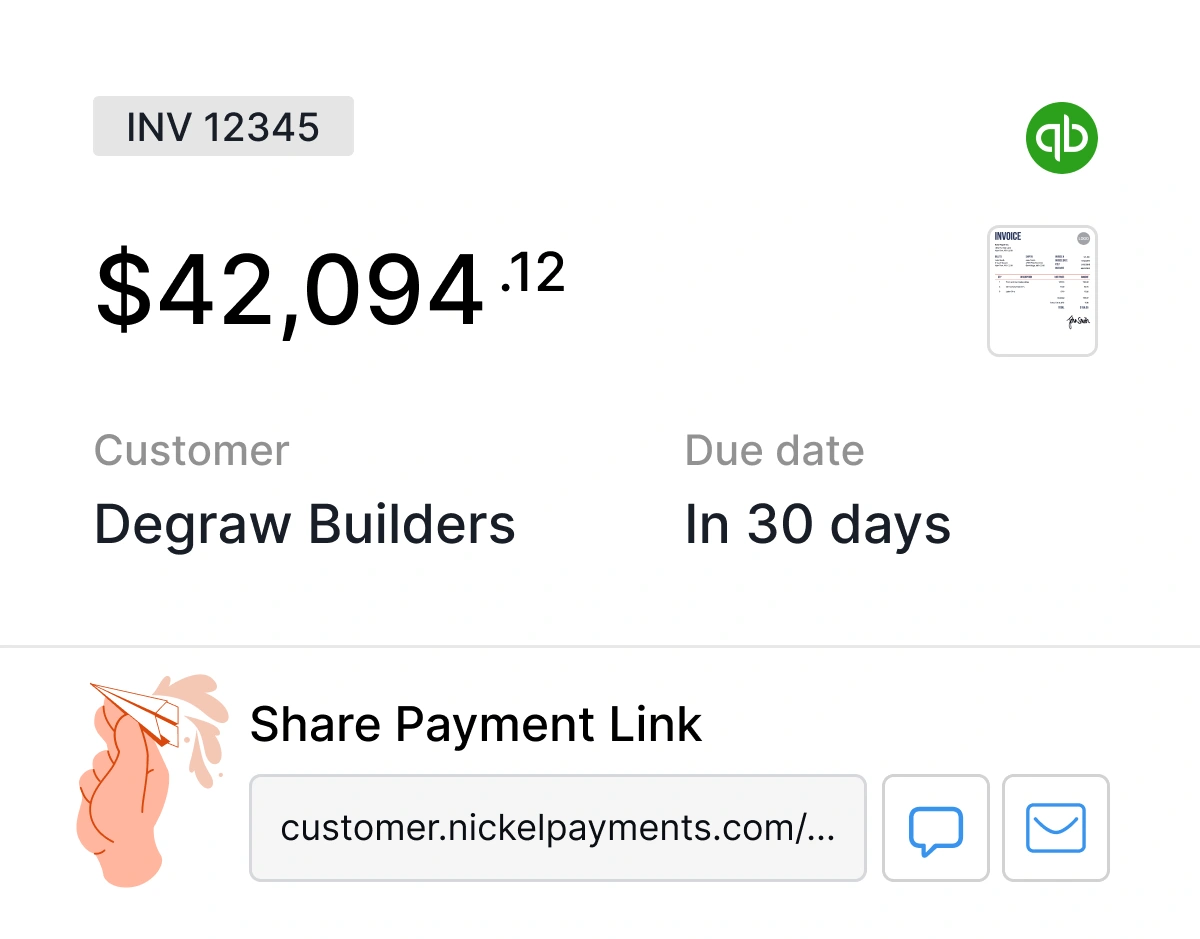The Payment Platform Built for Sheet Metal Workers
Streamline your cash flow with payments designed for HVAC and fabrication professionals

Trusted by 10,000+ industrial small businesses














































Why Sheet Metal Workers Are Switching to Nickel
Unlike traditional payment processors that treat you like a "high-risk" business, Nickel was built specifically for trade professionals who handle large invoice-based transactions. We understand that:
- $20,000 commercial HVAC installations are normal business, not suspicious activity
- Seasonal construction projects create payment surges that banks often flag as unusual
- You need reliable processing during peak building seasons
- Your cash flow depends on predictable payment timing, not arbitrary holds
Result: No surprise account holds, no "business verification" delays, no risk department calls.

Why Sheet Metal Workers Are Switching to Nickel
Unlike traditional payment processors that treat you like a "high-risk" business, Nickel was built specifically for trade professionals who handle large invoice-based transactions. We understand that:
- $20,000 commercial HVAC installations are normal business, not suspicious activity
- Seasonal construction projects create payment surges that banks often flag as unusual
- You need reliable processing during peak building seasons
- Your cash flow depends on predictable payment timing, not arbitrary holds
Result: No surprise account holds, no "business verification" delays, no risk department calls.
Before Nickel vs. After Nickel
Multiple systems for invoicing, payments, and bookkeeping
Banks freeze accounts over routine $20,000 commercial HVAC installations
Lose 1-3% on every transaction ($200-600 per major ductwork job)
Banks don't understand sheet metal business patterns and seasonal fluctuations
Hours spent matching payments to invoices in QuickBooks
Everything integrated: invoicing, payments, and QuickBooks sync
We understand large and variable transactions are normal for sheet metal workers and our support team is highly responsive if you ever run into issues
Keep 100% of what customers pay you
Designed around how your business actually works
Your invoices and payments automatically sync to the right customer, service call, and project, plus seamless AP integration
The Sheet Metal Fabrication Financial Reality
The sheet metal industry faces unique financial challenges that generic payment processors simply don't understand. With the global sheet metal market valued at $355.4 billion in 2024 and expected to reach $549.1 billion by 2037, sheet metal workers are caught between rising material costs and clients demanding flexible payment options.
Seasonal Cash Flow Volatility:
Sheet metal work experiences significant seasonal variations, with commercial HVAC projects clustering during construction seasons and residential work peaking in spring and fall. A simple residential ductwork job might cost $3,000, while a commercial building HVAC system can exceed $50,000. The starting pay for apprentices is usually around $20 per hour, while experienced workers earn $24-32 per hour. These payment spikes during busy seasons often trigger bank security flags, leading to account freezes right when you need cash flow most.
Material Cost Pressure:
Sheet metal projects require significant upfront investments in materials before work completion. Steel and aluminum prices can fluctuate 20-40% within months, forcing sheet metal workers to manage larger material costs while waiting for customer payments. When a commercial ductwork project requires $8,000 in materials alone, cash flow timing becomes critical for maintaining operations and meeting supplier obligations.
Equipment Investment Challenges:
Professional sheet metal fabrication equipment represents a massive investment. A quality plasma cutter costs $5,000-15,000, while a complete shop setup with brakes, shears, and forming equipment can exceed $50,000. Sheet metal workers must be able to lift and move ductwork that is heavy and cumbersome, requiring specialized tools that strain cash reserves when customer payments are delayed.
Project Complexity and Payment Delays:
Sheet metal fabrication involves multiple project phases - from design and cutting to forming, assembly, and installation. Commercial projects often involve change orders and approval processes that extend payment timelines. When 92 percent of construction companies report that their customers don't pay them on time, sheet metal contractors face constant cash flow challenges that affect their ability to take on new work.

The Sheet Metal Fabrication Financial Reality
The sheet metal industry faces unique financial challenges that generic payment processors simply don't understand. With the global sheet metal market valued at $355.4 billion in 2024 and expected to reach $549.1 billion by 2037, sheet metal workers are caught between rising material costs and clients demanding flexible payment options.
Seasonal Cash Flow Volatility:
Sheet metal work experiences significant seasonal variations, with commercial HVAC projects clustering during construction seasons and residential work peaking in spring and fall. A simple residential ductwork job might cost $3,000, while a commercial building HVAC system can exceed $50,000. The starting pay for apprentices is usually around $20 per hour, while experienced workers earn $24-32 per hour. These payment spikes during busy seasons often trigger bank security flags, leading to account freezes right when you need cash flow most.
Material Cost Pressure:
Sheet metal projects require significant upfront investments in materials before work completion. Steel and aluminum prices can fluctuate 20-40% within months, forcing sheet metal workers to manage larger material costs while waiting for customer payments. When a commercial ductwork project requires $8,000 in materials alone, cash flow timing becomes critical for maintaining operations and meeting supplier obligations.
Equipment Investment Challenges:
Professional sheet metal fabrication equipment represents a massive investment. A quality plasma cutter costs $5,000-15,000, while a complete shop setup with brakes, shears, and forming equipment can exceed $50,000. Sheet metal workers must be able to lift and move ductwork that is heavy and cumbersome, requiring specialized tools that strain cash reserves when customer payments are delayed.
Project Complexity and Payment Delays:
Sheet metal fabrication involves multiple project phases - from design and cutting to forming, assembly, and installation. Commercial projects often involve change orders and approval processes that extend payment timelines. When 92 percent of construction companies report that their customers don't pay them on time, sheet metal contractors face constant cash flow challenges that affect their ability to take on new work.
Simplified Modern Workflow
Send invoice (or use your existing invoicing)
Customer pays instantly via secure link
Payment auto-syncs to QuickBooks
Money hits your account in 2 business days
Built-in QuickBooks Integration
Your payments automatically sync to the right invoice, customer, and job. No more:


Compare: Nickel vs. Other Payment Platforms
What This Means for Your Sheet Metal Business
Save Money
Zero ACH fees: Save $5,000-15,000 per year on a typical sheet metal business No hidden costs: No setup fees, monthly fees, or surprise charges Early payment discounts: Pay and get paid faster, capture supplier discounts
Save Time
Automated reconciliation: 3+ hours per week saved on bookkeeping Instant invoicing: Send payment links directly from job sites One system: Stop switching between payment apps, banking apps, and QuickBooks
Reduce Risk
Process large payments worry-free: We understand sheet metal transactions and provide responsive support when needed Predictable processing: Money hits your account in 2 business days Secure payments: Bank-level security without the bank headaches
Sheet Metal Industry Payment Breakdown
The sheet metal fabrication services market was valued at $21.35 billion in 2024 and is predicted to reach $33.31 billion by 2034, expanding at a CAGR of 4.55%. This growth brings unique financial pressures that traditional payment processors weren't designed to handle.
Market Fragmentation:
Sheet metal workers held about 127,000 jobs in 2024, with most operations being small businesses handling diverse project sizes. The median annual wage for sheet metal workers was $60,850 in May 2024, with experienced workers earning between $39,581 to $87,470 depending on specialization. These smaller operations lack the leverage to negotiate better payment terms with banks or processors, often getting stuck with high fees and restrictive policies designed for larger enterprises.
Project Economics:
Sheet metal fabrication involves complex pricing structures. A residential HVAC installation might range from $3,000-8,000, while commercial projects can exceed $50,000. Material costs typically represent 40-50% of project costs, and when customers pay by credit card, processors typically charge 2.9-3.5% plus transaction fees, eating directly into already competitive margins in this skilled trade.
Equipment Financing Challenges:
Sheet metal fabricators usually work in manufacturing plants and small shops, where they often lift heavy materials and stand for long periods. Professional equipment requires significant upfront investment - plasma cutters, CNC machines, and specialized forming equipment can cost $100,000+ for a complete shop setup. Traditional financing often doesn't understand the project-based nature of sheet metal work, making it difficult to secure equipment loans that align with seasonal cash flow patterns.
Workforce Payment Complexity:
Nearly 60% of construction firms face cash flow challenges, and sheet metal contractors are particularly vulnerable due to their position in the construction payment chain. When general contractors delay payments, sheet metal workers struggle to meet payroll for their teams. With apprentices starting around $16-20 per hour and journeymen earning $24-32 per hour, maintaining consistent payroll during payment delays becomes a constant stress point.

Sheet Metal Industry Payment Breakdown
The sheet metal fabrication services market was valued at $21.35 billion in 2024 and is predicted to reach $33.31 billion by 2034, expanding at a CAGR of 4.55%. This growth brings unique financial pressures that traditional payment processors weren't designed to handle.
Market Fragmentation:
Sheet metal workers held about 127,000 jobs in 2024, with most operations being small businesses handling diverse project sizes. The median annual wage for sheet metal workers was $60,850 in May 2024, with experienced workers earning between $39,581 to $87,470 depending on specialization. These smaller operations lack the leverage to negotiate better payment terms with banks or processors, often getting stuck with high fees and restrictive policies designed for larger enterprises.
Project Economics:
Sheet metal fabrication involves complex pricing structures. A residential HVAC installation might range from $3,000-8,000, while commercial projects can exceed $50,000. Material costs typically represent 40-50% of project costs, and when customers pay by credit card, processors typically charge 2.9-3.5% plus transaction fees, eating directly into already competitive margins in this skilled trade.
Equipment Financing Challenges:
Sheet metal fabricators usually work in manufacturing plants and small shops, where they often lift heavy materials and stand for long periods. Professional equipment requires significant upfront investment - plasma cutters, CNC machines, and specialized forming equipment can cost $100,000+ for a complete shop setup. Traditional financing often doesn't understand the project-based nature of sheet metal work, making it difficult to secure equipment loans that align with seasonal cash flow patterns.
Workforce Payment Complexity:
Nearly 60% of construction firms face cash flow challenges, and sheet metal contractors are particularly vulnerable due to their position in the construction payment chain. When general contractors delay payments, sheet metal workers struggle to meet payroll for their teams. With apprentices starting around $16-20 per hour and journeymen earning $24-32 per hour, maintaining consistent payroll during payment delays becomes a constant stress point.
Ranked #1 Easiest to Use Payment Solution by G2
See why Nickel outranks every major competitor, including Forwardly, Melio, and Square
Get Started in Minutes
No contracts. No setup fees. No risk.
Sign Up (2 minutes)
Connect QuickBooks (1 click)
Start Getting Paid (immediately)

Ready to Fix Your Payment Problems?
Stop losing money to fees and time to complicated workflows. Join thousands of contractors who've already made the switch.








